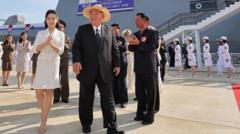As tensions rise regarding colonial legacy, the Ivory Coast's announcement to dismiss French forces reflects a growing trend of military self-reliance among West African states.
### Transition of Power: Ivory Coast Phases Out French Military Presence

### Transition of Power: Ivory Coast Phases Out French Military Presence
**Ivory Coast signals military independence as French troops set to withdraw, signifying shifting dynamics in West Africa.**
The Ivory Coast is poised to witness a significant shift in its military alignment as President Alassane Ouattara announced the withdrawal of French troops from the country. This decision marks a critical step towards enhancing national sovereignty and military independence amid evolving political dynamics in the region. The withdrawal is expected to occur within this month after the handover of a key military camp in Abidjan, the country's capital.
During a nationally broadcast address on New Year’s Eve, Ouattara expressed confidence in the modernization of the Ivorian military, asserting that the time had come for the coordinated and organized departure of French forces. “We can be proud of our army, whose modernization is now complete,” he stated, reinforcing the notion of self-sufficiency that resonates throughout West Africa.
The withdrawal of French troops comes at a time when France's influence in its former colonies is diminishing. Other nations, including Chad and Senegal, have already taken steps to reduce French military presence, showcasing a regional trend towards independence from former colonial powers. France's military footprint in Africa is now largely confined to Djibouti and Gabon, starkly contrasting with the substantial deployments seen in the Sahel just three years ago.
Growing criticism directed at France from its former colonies has brought issues of neocolonialism and patronization to the forefront. Many countries in West Africa have expressed discontent with the French military involvement, using the sentiment to bolster support for ruling military juntas amid a backdrop of recent coup d'états.
France has refrained from commenting publicly on the withdrawal from the Ivory Coast, which further exemplifies the evolving relationship between the two countries. The actions of President Ouattara signal a commitment to strengthening national defenses while navigating the complexities of international relations in a rapidly changing geopolitical landscape.
Ruth Maclean reports from Dakar, offering insights into the broader implications of this military transition and the rippling effects throughout West Africa.




















